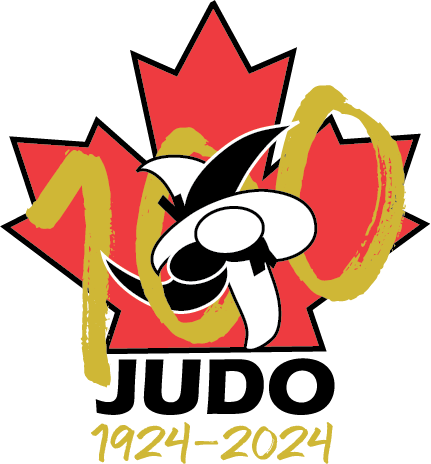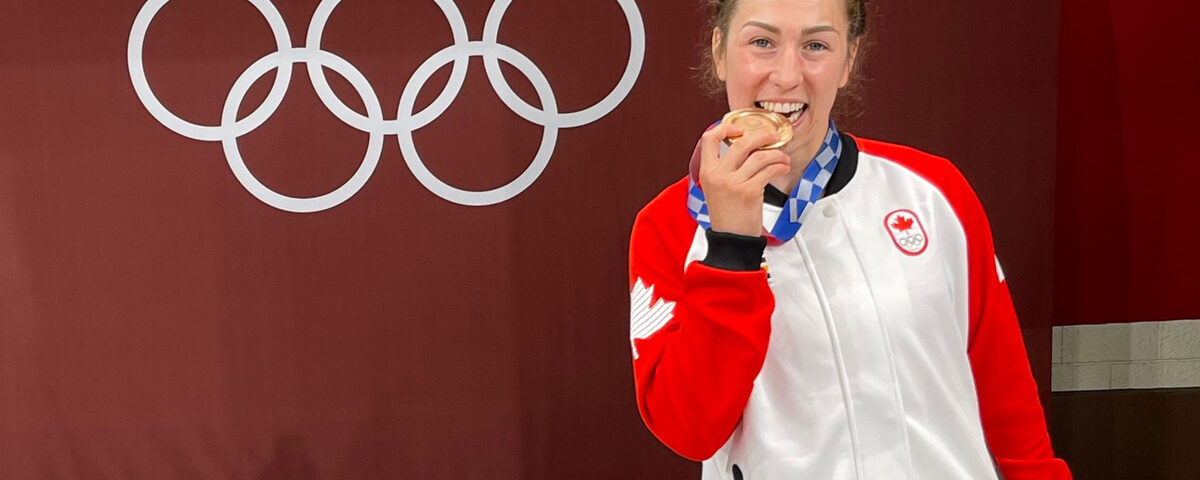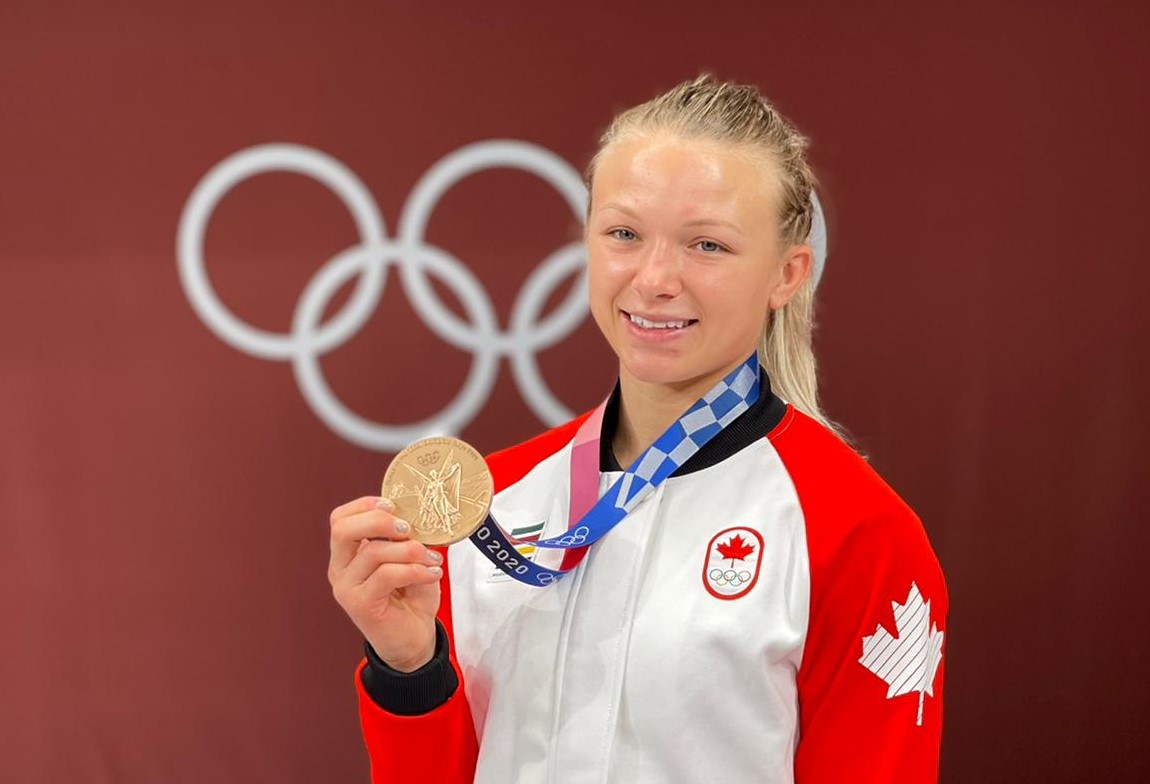
Klimkait Makes History
26 July 2021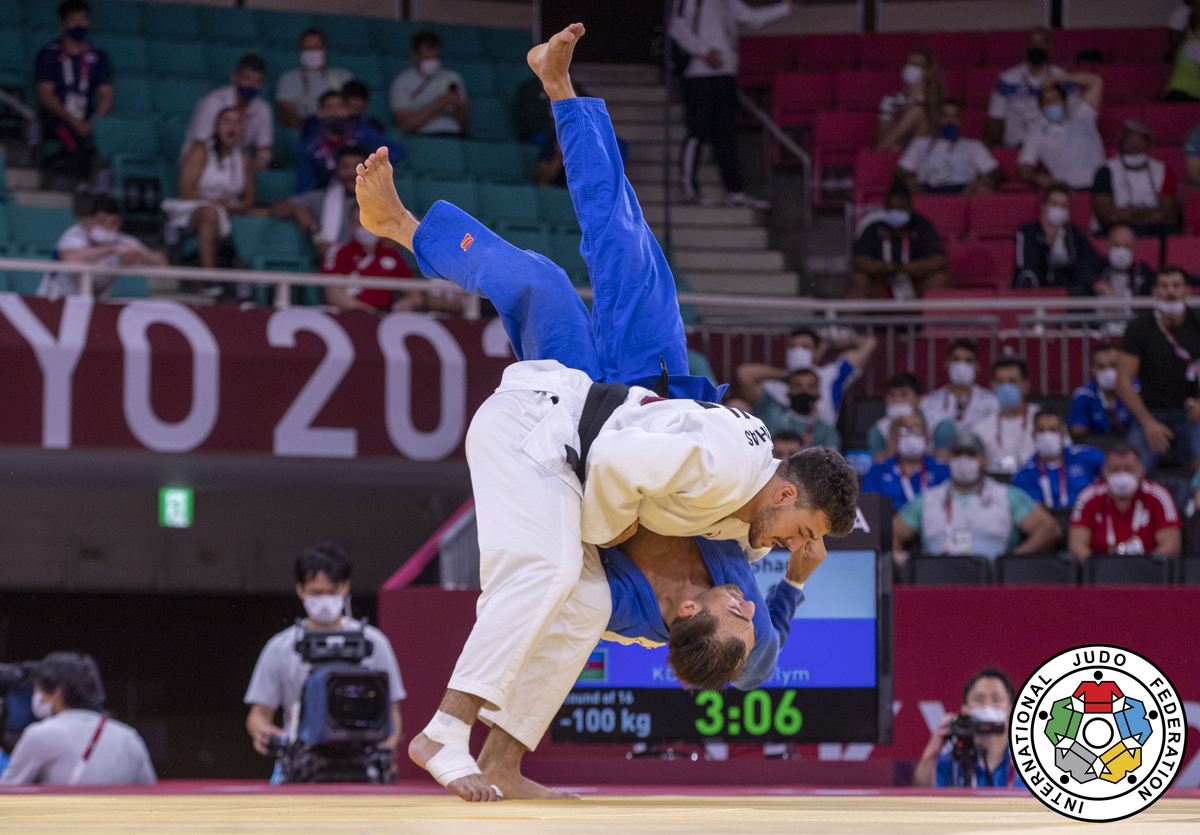
El Nahas Places Fifth to Conclude Historic Olympic Games for Canadian Judo
30 July 2021Makes History for Second Day in a Row
Today, it was Catherine Beauchemin-Pinard’s turn to leave her mark on Canadian judo history by winning an Olympic bronze medal in the under-63 kg category. The Tokyo 2020 Games will therefore be remembered as the first Olympics where Canada won two judo medals, in the same location that Doug Roger won the country’s first, 56 years ago.
“It was an incredible day, almost perfect. It took me a minute to realize that I’m now an Olympic medallist. It was a long battle, so I was really happy to be able to push through to the end. And I was very glad to see Antoine Valois-Fortier, Arthur Margelidon and Sasha Mehmedovic after my win. I was feeling a bit overwhelmed and was having trouble understanding what was going on,” stated Beauchemin-Pinard with a smile in her voice after receiving her medal.
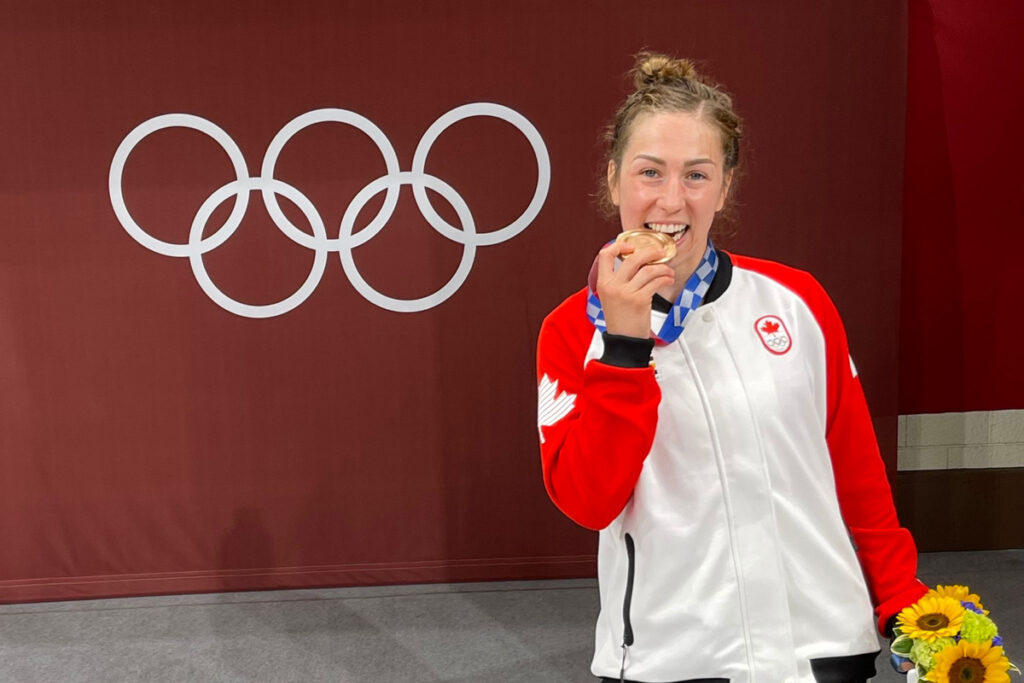
Catherine Beauchemin-Pinard, Tokyo Games Bronze medallist.
The Montrealer beat Venezuela’s Anriquelis Barrios by waza-ari in overtime to snag the bronze medal.
A few minutes earlier, she had been denied her spot in the gold medal final by France’s Clarisse Agbegnenou. She had faced a tough battle against the five-time world champion and had fought hard until the last second, but eventually bowed out by waza-ari.
“I wanted to control her left side, that was my strategy, but she was really strong today. She deserved the gold.”
In the gold medal final, Agbegnenou defeated Slovenia’s Tina Trstenjak to earn the top spot on the podium.
She also took the time to commend Beauchemin-Pinard during a post-event press conference. She praised the Québécoise’s fighting spirit, as well as her combativeness over the past few months.
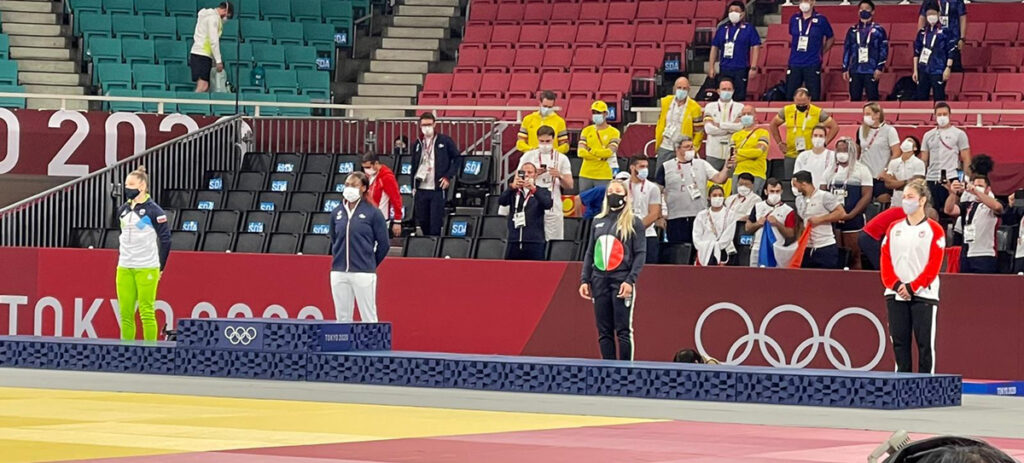
Three Decisive Early Bouts
Beauchemin-Pinard was unstoppable in her first three rounds. She began with a victory by ippon over Denmark’s Laerke Olsen, then quickly took control of her match against Austria’s Magdalena Krssakova in the round of 16, deciding her fate in 38 seconds.
Her next victim was Brazil’s Ketleyn Quadros in the quarter-final. Beauchemin-Pinard defeated Quadros by a double waza-ari combo, scoring an ippon with less than a minute to go.
“I felt some stress in my first match. Olsen was very well-prepared, and her defence was flawless. I was glad to find a chink in her armour and get her on the ground. In my second bout, I was surprised to be able to end it so quickly. Finally, against the Brazilian, I felt ready. When I saw an opportunity to attack, I didn’t hesitate, and that’s how I won.”
To close out her tournament, the 27-year-old succeeded in emulating her countrymate Jessica Klimkait, who won a bronze medal in the under-57 kg category yesterday. Klimkait and Beauchemin-Pinard are the first two Canadian women to climb onto the Olympic podium in judo. Together, they also made history by claiming two judo medals for the country at the same Olympic Games.
“We can’t forget that these are Judo Canada’s best Olympics ever, with two bronze medals and Arthur Margelidon’s fifth-place finish. I’m very happy to be a part of history, and personally, this will stay with me for life.”
Antoine Valois-Fortier Eliminated in Round of Sixteen
Antoine Valois-Fortier’s run in the under-81 kg category came to an earlier end than expected when he was defeated by waza-ari by Russia’s Alan Khubetsov in the round of 16.
“Obviously, I would have liked to get past Khubetsov. I’ve beaten him in the past, so I knew I was capable of it. I had a good game plan. I wanted to get my right hand on his backhand side to keep some distance between us, but in the first minute, I caught on that his goal was to prevent me from placing my hand there. I didn’t get the chance to adapt my approach before he scored.”
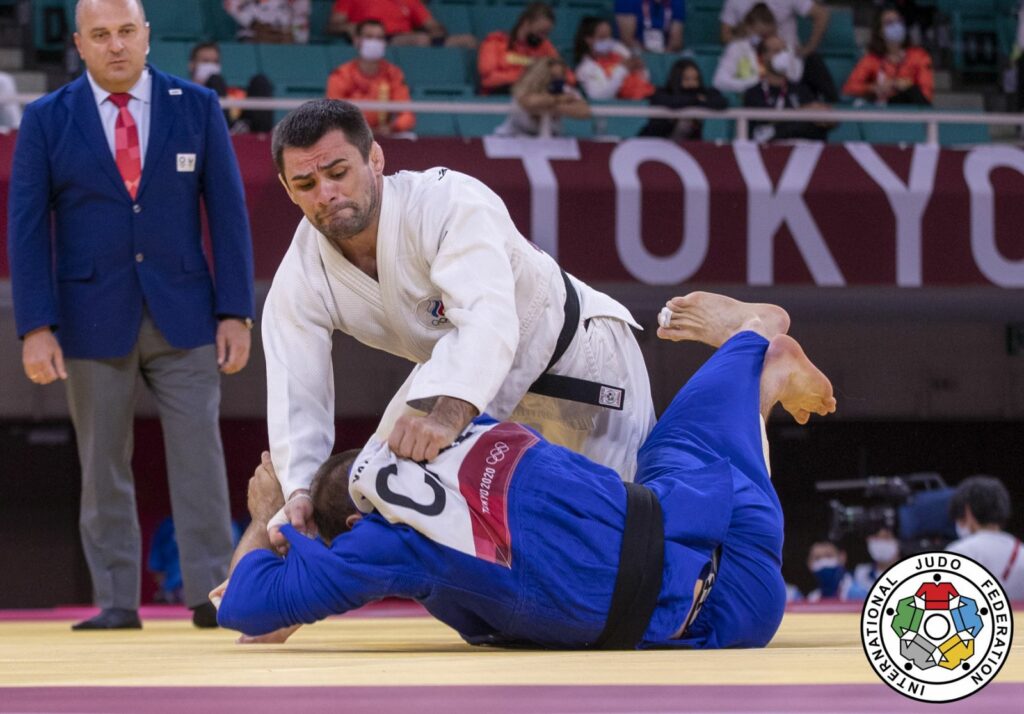
Antoine Valois-Fortier (blue) against Alan Khubetsov.
Khubetsov scored the waza-ari only 23 seconds into the bout. Valois-Fortier therefore had to fight even harder to even the score, but his efforts were in vain.
“I chased him for a long time. At one point, I think I came close to scoring by shoving him to the side, but unfortunately, it didn’t count. The ball was in my court. I had to go all-in if I wanted to score.”
The 31-year-old judoka’s day started well with a victory over Greece’s Alexios Ntanatsidis, after the latter received three penalties. It was a tough match, but Valois-Fortier believes he did not expend too much energy in his first round.
“I didn’t feel like I was running out of energy. I had a lot of good recovery time between fights. We train to be able to handle several tough matches in a day.”
This was the Quebec City native’s third Olympic appearance. After a bronze medal in London in 2012 and a seventh-place finish in Rio in 2016, he wanted to experience the Tokyo Games to the fullest, without feeling unnecessary pressure.
“I feel more serene than I did in Rio, but I won’t deny that I’m disappointed in my day. The past five years have been very demanding. I’m disappointed, but happy with the distance I’ve covered.”
Was this the final fight of Valois-Fortier’s career? It’s still too early to answer that question, but Valois-Fortier will take some time to reflect upon it over the next few weeks with his coach Nicolas Gill.
“I haven’t made any decisions about what’s next. For now, I want to rest, cheer on my teammates and enjoy everything I’ve been denied over the past few months.”
In the under-81 kg category, the gold medal went to Japan’s Takanori Nagase, who beat Mongolia’s Saeid Mollaei by waza-ari in the final.
Shady El-Nahas will be the final Canadian to hit the tatamis of the Nippon Budokan at the Tokyo Olympic Games on Thursday, July 29. The Ontarian will face Ivan Remarenco of the United Arab Emirates in the first round of the under-100 kg class.



